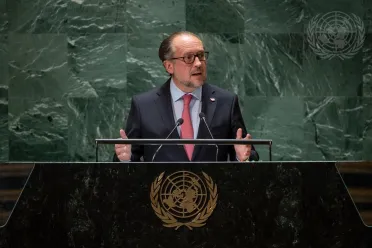Statement
Statement summary
ALEXANDER SCHALLENBERG, Federal Minister for European and International Affairs of Austria, reiterated his Government’s deep investment in multilateralism, as part of the country’s DNA. “Militarily neutral, export-oriented, and at the heart of the European continent,” Austria is a “proud home” of one of the United Nations Headquarters and over 50 international organizations. “The rules-based international order is our only protective shield against a world where might makes right, where unilateralism and the use of force rule,” he said. Since 1960, Austrian Blue Helmets have been supporting peacekeeping to bring stability to the region. As a country that shrank after the First World War from an empire with over 50 million people to a State of less than 10 million, with a fraction of its former territory, Austria learned from its history. Societies based on freedom, pluralism, and individual rights are “the best guarantee for our citizens’ security and prosperity.”
At the same time, the current international order is not inclusive enough, and the Security Council needs to offer a seat to more countries left out, including from Africa. Austria will continue pushing for reform, he emphasized, including through its candidacy for a non-permanent seat in 2026. The multilateral system has not been proactive or effective enough, including in Afghanistan, the Sahel, and Ukraine — where the Russian Federation has invaded its sovereign neighbour “in a fit of neo-imperialist aggression.” Reflecting its deep investment in cooperation and partnerships, Austria has increased outreach to the Asia-Pacific region and engaged with African partners in the spirit of mutual respect and common interests. Rather than believing that problems can be solved by simply negating them, pulling up the drawbridge, or decoupling from reality, the international community must adapt, innovate, and recalibrate cooperation. He cautioned against “polarizing populists who spread fake news and offer seemingly easy answers to complex questions,” from climate change and disruptive technologies like artificial intelligence to growing geopolitical multipolarity and economic dependencies.
Rather than “championing nihilism or moral reductionism,” he called for “real dialogue” and compromise that promotes principles and values without denying other points of view. Austria will continue to champion “sensible and pragmatic multilateralism” that requires “endurance, strategic patience, and a healthy dose of realism.” There is “simply no better alternative” to tackle global challenges and safeguard prosperity and security. Reverting to moralizing, finger-pointing, or self-righteousness is not responsible statecraft. “It will only strengthen the fringes of our societies, not the centre,” he warned.
Full statement
Read the full statement, in PDF format.
Photo

Previous sessions
Access the statements from previous sessions.
